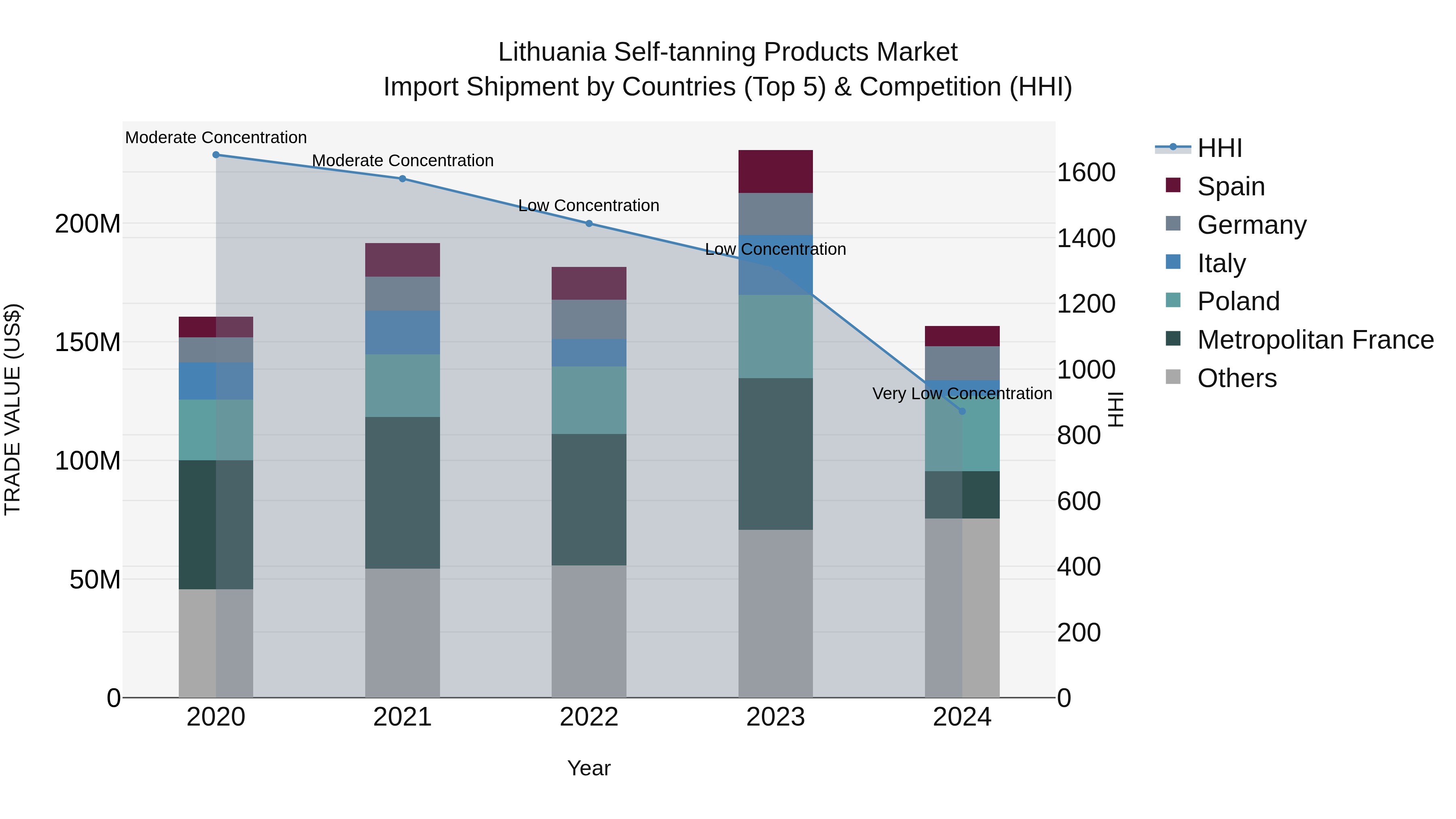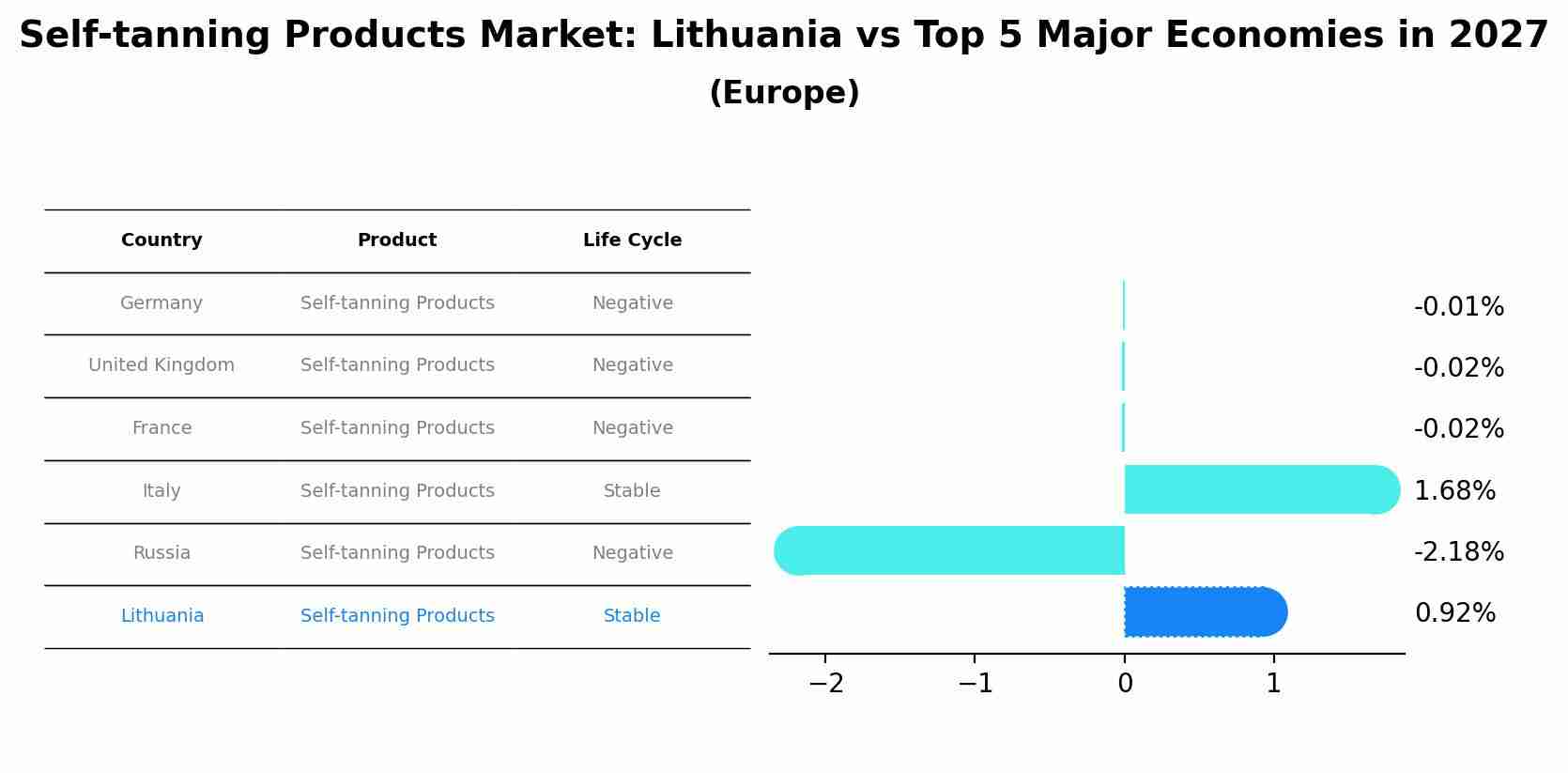Lithuania Self-tanning Products Market (2025-2031) | Industry, Forecast, Segmentation, Share, Outlook, Value, Trends, Revenue, Size, Companies, Analysis & Growth
| Product Code: ETC5318197 | Publication Date: Nov 2023 | Updated Date: Nov 2025 | Product Type: Market Research Report | |
| Publisher: 6Wresearch | Author: Ravi Bhandari | No. of Pages: 60 | No. of Figures: 30 | No. of Tables: 5 |
Lithuania Self-tanning Products Market Top 5 Importing Countries and Market Competition (HHI) Analysis
The self-tanning products import market in Lithuania saw a significant decline in 2024, with a negative Compound Annual Growth Rate (CAGR) of -0.6% from 2020 to 2024. The top exporting countries to Lithuania include Poland, Metropolitan France, Germany, Latvia, and other European countries. The market concentration, as measured by the Herfindahl-Hirschman Index (HHI), decreased from low to very low concentration levels between 2023 and 2024. The steep decline in growth rate from 2023 to 2024 at -32.09% indicates a challenging year for the self-tanning products import market in Lithuania.

Self-tanning Products Market: Lithuania vs Top 5 Major Economies in 2027 (Europe)
Lithuania's Self-tanning Products market is anticipated to experience a stable growth rate of 0.92% by 2027, reflecting trends observed in the largest economy Germany, followed by United Kingdom, France, Italy and Russia.

Key Highlights of the Report:
- Lithuania Self-tanning Products Market Outlook
- Market Size of Lithuania Self-tanning Products Market, 2024
- Forecast of Lithuania Self-tanning Products Market, 2031
- Historical Data and Forecast of Lithuania Self-tanning Products Revenues & Volume for the Period 2021-2031
- Lithuania Self-tanning Products Market Trend Evolution
- Lithuania Self-tanning Products Market Drivers and Challenges
- Lithuania Self-tanning Products Price Trends
- Lithuania Self-tanning Products Porter`s Five Forces
- Lithuania Self-tanning Products Industry Life Cycle
- Historical Data and Forecast of Lithuania Self-tanning Products Market Revenues & Volume By Product Form for the Period 2021-2031
- Historical Data and Forecast of Lithuania Self-tanning Products Market Revenues & Volume By Self-Tan Lotion for the Period 2021-2031
- Historical Data and Forecast of Lithuania Self-tanning Products Market Revenues & Volume By Self-Tan Spray for the Period 2021-2031
- Historical Data and Forecast of Lithuania Self-tanning Products Market Revenues & Volume By Self-Tan Oil for the Period 2021-2031
- Historical Data and Forecast of Lithuania Self-tanning Products Market Revenues & Volume By Self-Tan Mousse for the Period 2021-2031
- Historical Data and Forecast of Lithuania Self-tanning Products Market Revenues & Volume By Self-Tan Drops for the Period 2021-2031
- Historical Data and Forecast of Lithuania Self-tanning Products Market Revenues & Volume By Self-Tan Wipes for the Period 2021-2031
- Historical Data and Forecast of Lithuania Self-tanning Products Market Revenues & Volume By Others for the Period 2021-2031
- Historical Data and Forecast of Lithuania Self-tanning Products Market Revenues & Volume By End-User for the Period 2021-2031
- Historical Data and Forecast of Lithuania Self-tanning Products Market Revenues & Volume By Household for the Period 2021-2031
- Historical Data and Forecast of Lithuania Self-tanning Products Market Revenues & Volume By Commercial for the Period 2021-2031
- Historical Data and Forecast of Lithuania Self-tanning Products Market Revenues & Volume By Distribution Channel for the Period 2021-2031
- Historical Data and Forecast of Lithuania Self-tanning Products Market Revenues & Volume By Offline for the Period 2021-2031
- Historical Data and Forecast of Lithuania Self-tanning Products Market Revenues & Volume By Online for the Period 2021-2031
- Lithuania Self-tanning Products Import Export Trade Statistics
- Market Opportunity Assessment By Product Form
- Market Opportunity Assessment By End-User
- Market Opportunity Assessment By Distribution Channel
- Lithuania Self-tanning Products Top Companies Market Share
- Lithuania Self-tanning Products Competitive Benchmarking By Technical and Operational Parameters
- Lithuania Self-tanning Products Company Profiles
- Lithuania Self-tanning Products Key Strategic Recommendations
Frequently Asked Questions About the Market Study (FAQs):
1 Executive Summary |
2 Introduction |
2.1 Key Highlights of the Report |
2.2 Report Description |
2.3 Market Scope & Segmentation |
2.4 Research Methodology |
2.5 Assumptions |
3 Lithuania Self-tanning Products Market Overview |
3.1 Lithuania Country Macro Economic Indicators |
3.2 Lithuania Self-tanning Products Market Revenues & Volume, 2021 & 2031F |
3.3 Lithuania Self-tanning Products Market - Industry Life Cycle |
3.4 Lithuania Self-tanning Products Market - Porter's Five Forces |
3.5 Lithuania Self-tanning Products Market Revenues & Volume Share, By Product Form, 2021 & 2031F |
3.6 Lithuania Self-tanning Products Market Revenues & Volume Share, By End-User, 2021 & 2031F |
3.7 Lithuania Self-tanning Products Market Revenues & Volume Share, By Distribution Channel, 2021 & 2031F |
4 Lithuania Self-tanning Products Market Dynamics |
4.1 Impact Analysis |
4.2 Market Drivers |
4.2.1 Increasing awareness and acceptance of self-tanning products in Lithuania |
4.2.2 Growing desire for a healthy and sun-kissed appearance without sun exposure |
4.2.3 Influence of social media and beauty trends promoting self-tanning products |
4.3 Market Restraints |
4.3.1 Concerns about the safety and potential health risks associated with self-tanning products |
4.3.2 Seasonal demand fluctuations due to varying weather conditions in Lithuania |
4.3.3 Competition from traditional tanning methods and professional tanning services |
5 Lithuania Self-tanning Products Market Trends |
6 Lithuania Self-tanning Products Market Segmentations |
6.1 Lithuania Self-tanning Products Market, By Product Form |
6.1.1 Overview and Analysis |
6.1.2 Lithuania Self-tanning Products Market Revenues & Volume, By Self-Tan Lotion, 2021-2031F |
6.1.3 Lithuania Self-tanning Products Market Revenues & Volume, By Self-Tan Spray, 2021-2031F |
6.1.4 Lithuania Self-tanning Products Market Revenues & Volume, By Self-Tan Oil, 2021-2031F |
6.1.5 Lithuania Self-tanning Products Market Revenues & Volume, By Self-Tan Mousse, 2021-2031F |
6.1.6 Lithuania Self-tanning Products Market Revenues & Volume, By Self-Tan Drops, 2021-2031F |
6.1.7 Lithuania Self-tanning Products Market Revenues & Volume, By Self-Tan Wipes, 2021-2031F |
6.2 Lithuania Self-tanning Products Market, By End-User |
6.2.1 Overview and Analysis |
6.2.2 Lithuania Self-tanning Products Market Revenues & Volume, By Household, 2021-2031F |
6.2.3 Lithuania Self-tanning Products Market Revenues & Volume, By Commercial, 2021-2031F |
6.3 Lithuania Self-tanning Products Market, By Distribution Channel |
6.3.1 Overview and Analysis |
6.3.2 Lithuania Self-tanning Products Market Revenues & Volume, By Offline, 2021-2031F |
6.3.3 Lithuania Self-tanning Products Market Revenues & Volume, By Online, 2021-2031F |
7 Lithuania Self-tanning Products Market Import-Export Trade Statistics |
7.1 Lithuania Self-tanning Products Market Export to Major Countries |
7.2 Lithuania Self-tanning Products Market Imports from Major Countries |
8 Lithuania Self-tanning Products Market Key Performance Indicators |
8.1 Customer satisfaction levels with self-tanning products |
8.2 Frequency of product usage among consumers |
8.3 Number of new product launches and innovations in the self-tanning market segment |
8.4 Engagement rates on social media platforms for self-tanning brands |
8.5 Percentage of repeat purchases among consumers |
9 Lithuania Self-tanning Products Market - Opportunity Assessment |
9.1 Lithuania Self-tanning Products Market Opportunity Assessment, By Product Form, 2021 & 2031F |
9.2 Lithuania Self-tanning Products Market Opportunity Assessment, By End-User, 2021 & 2031F |
9.3 Lithuania Self-tanning Products Market Opportunity Assessment, By Distribution Channel, 2021 & 2031F |
10 Lithuania Self-tanning Products Market - Competitive Landscape |
10.1 Lithuania Self-tanning Products Market Revenue Share, By Companies, 2024 |
10.2 Lithuania Self-tanning Products Market Competitive Benchmarking, By Operating and Technical Parameters |
11 Company Profiles |
12 Recommendations | 13 Disclaimer |
Export potential assessment - trade Analytics for 2030
Export potential enables firms to identify high-growth global markets with greater confidence by combining advanced trade intelligence with a structured quantitative methodology. The framework analyzes emerging demand trends and country-level import patterns while integrating macroeconomic and trade datasets such as GDP and population forecasts, bilateral import–export flows, tariff structures, elasticity differentials between developed and developing economies, geographic distance, and import demand projections. Using weighted trade values from 2020–2024 as the base period to project country-to-country export potential for 2030, these inputs are operationalized through calculated drivers such as gravity model parameters, tariff impact factors, and projected GDP per-capita growth. Through an analysis of hidden potentials, demand hotspots, and market conditions that are most favorable to success, this method enables firms to focus on target countries, maximize returns, and global expansion with data, backed by accuracy.
By factoring in the projected importer demand gap that is currently unmet and could be potential opportunity, it identifies the potential for the Exporter (Country) among 190 countries, against the general trade analysis, which identifies the biggest importer or exporter.
To discover high-growth global markets and optimize your business strategy:
Click Here- Single User License$ 1,995
- Department License$ 2,400
- Site License$ 3,120
- Global License$ 3,795
Search
Thought Leadership and Analyst Meet
Our Clients
Related Reports
- Pakistan Contraceptive Implants Market (2025-2031) | Demand, Growth, Size, Share, Industry, Pricing Analysis, Competitive, Strategic Insights, Strategy, Consumer Insights, Analysis, Investment Trends, Opportunities, Revenue, Segments, Value, Segmentation, Supply, Forecast, Restraints, Outlook, Competition, Drivers, Trends, Companies, Challenges
- Sri Lanka Packaging Market (2026-2032) | Outlook, Competition, Drivers, Trends, Demand, Pricing Analysis, Competitive, Strategic Insights, Companies, Challenges, Strategy, Consumer Insights, Analysis, Investment Trends, Opportunities, Growth, Size, Share, Industry, Revenue, Segments, Value, Segmentation, Supply, Forecast, Restraints
- India Kids Watches Market (2026-2032) | Strategy, Consumer Insights, Analysis, Investment Trends, Opportunities, Growth, Size, Share, Industry, Revenue, Segments, Value, Segmentation, Supply, Forecast, Restraints, Outlook, Competition, Drivers, Trends, Demand, Pricing Analysis, Competitive, Strategic Insights, Companies, Challenges
- Saudi Arabia Core Assurance Service Market (2025-2031) | Strategy, Consumer Insights, Analysis, Investment Trends, Opportunities, Growth, Size, Share, Industry, Revenue, Segments, Value, Segmentation, Supply, Forecast, Restraints, Outlook, Competition, Drivers, Trends, Demand, Pricing Analysis, Competitive, Strategic Insights, Companies, Challenges
- Romania Uninterruptible Power Supply (UPS) Market (2026-2032) | Industry, Analysis, Revenue, Size, Forecast, Outlook, Value, Trends, Share, Growth & Companies
- Saudi Arabia Car Window Tinting Film, Paint Protection Film (PPF), and Ceramic Coating Market (2025-2031) | Strategy, Consumer Insights, Analysis, Investment Trends, Opportunities, Growth, Size, Share, Industry, Revenue, Segments, Value, Segmentation, Supply, Forecast, Restraints, Outlook, Competition, Drivers, Trends, Demand, Pricing Analysis, Competitive, Strategic Insights, Companies, Challenges
- South Africa Stationery Market (2025-2031) | Share, Size, Industry, Value, Growth, Revenue, Analysis, Trends, Segmentation & Outlook
- Afghanistan Rocking Chairs And Adirondack Chairs Market (2026-2032) | Size & Revenue, Competitive Landscape, Share, Segmentation, Industry, Value, Outlook, Analysis, Trends, Growth, Forecast, Companies
- Afghanistan Apparel Market (2026-2032) | Growth, Outlook, Industry, Segmentation, Forecast, Size, Companies, Trends, Value, Share, Analysis & Revenue
- Canada Oil and Gas Market (2026-2032) | Share, Segmentation, Value, Industry, Trends, Forecast, Analysis, Size & Revenue, Growth, Competitive Landscape, Outlook, Companies
Industry Events and Analyst Meet
Whitepaper
- Middle East & Africa Commercial Security Market Click here to view more.
- Middle East & Africa Fire Safety Systems & Equipment Market Click here to view more.
- GCC Drone Market Click here to view more.
- Middle East Lighting Fixture Market Click here to view more.
- GCC Physical & Perimeter Security Market Click here to view more.
6WResearch In News
- Doha a strategic location for EV manufacturing hub: IPA Qatar
- Demand for luxury TVs surging in the GCC, says Samsung
- Empowering Growth: The Thriving Journey of Bangladesh’s Cable Industry
- Demand for luxury TVs surging in the GCC, says Samsung
- Video call with a traditional healer? Once unthinkable, it’s now common in South Africa
- Intelligent Buildings To Smooth GCC’s Path To Net Zero


















